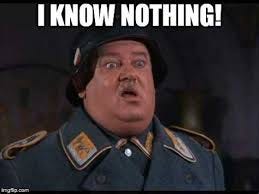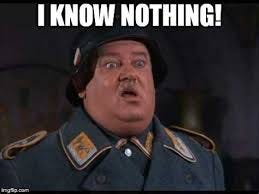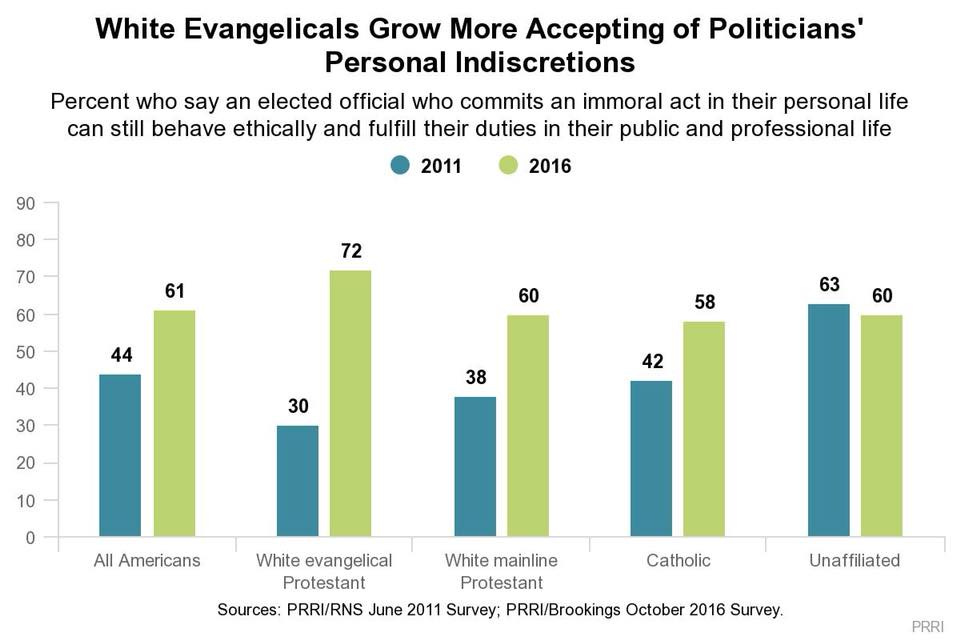A couple of introductory notes. First, I submitted my Fearless Christian University manuscript to my publisher last Wednesday. That will free me up to return to posting here three days a week. Second, for those who have recently subscribed (welcome!) and for old friends, consider switching to a paid subscription to support my writing. Thanks!
The algorithms of Facebook thought I needed to know that yesterday would have been the 113th birthday of John Banner, who played Sgt. Schultz on the late 1960s sitcom, “Hogan’s Heroes”. Even if you’re younger than me and never watched the show, you know about Sgt. Schultz because his catchphrase has survived him.
This birthday reminder stayed with me as I looked at the news yesterday. Nikki Haley was on Meet the Press and continued her critiques of Donald Trump as she pursues her long-shot (and likely nonexistent) path to the Republican nomination. While much of what she said was on target, I was struck with this exchange:
KRISTEN WELKER:
So, I hear you saying you are in this regardless of the results in South Carolina through Super Tuesday, it sounds like. Here's how the Wall Street Journal editorial board is thinking about your campaign. They write, "If she can remain competitive, there's an argument for Ms. Haley to stay in the race through the July convention. Mr. Trump faces a treacherous legal road, and one of the cases against him could go to trial. If he's convicted of a felony, 42% of voters in New Hampshire and nearly a third of Iowa's GOP caucus-goers said Mr. Trump would be unfit for the presidency." Are you staying in this race in case Donald Trump is convicted of a crime, ambassador?
AMB. NIKKI HALEY:
I've never stayed in this race because of court cases. You know, really, I don't know what all the court cases are. I haven't paid attention to what he's won, what he's lost, what he's fighting for, any of that. What I know is, you know, the first one came down, and he spent a lot of time ranting about how he lost that court case. But the reality is every time he's talking about defending himself in court, he's not talking about getting our economy back on track. He's not talking about closing the border. He's not talking about how we're going to get our kids reading again and getting us focused again. He's not talking about law and order. That's the problem is – he's not talking about what the American people want. Kristen, look at what happened just in the 48 hours after the election. Here he went on a – he was totally unhinged, went on a rampage election night talking about revenge. Then, the next day, he goes and says, “Anybody who supports me is not going to be allowed to be part of MAGA.” Well, that means those people that voted for me in Iowa and New Hampshire and those people who donated to me, really, you're going to go and say they're not in your club? You're supposed to be president representing everyone. Then, he goes and pushes the Republican Party to make him the nominee? I mean, look, he's insecure. He's threatened. He sees what's happening, and he knows these court cases are going to take him further and further away from the campaign trail.
Haley did acknowledge that the jurors had reached their decision through normal due process (a low bar others railing about “New York Juries” haven’t cleared). And she’s correct that Trump’s grievances crowded out any policy conversations.
But I get caught up in the highlighted phrase above. She says that she doesn’t know what these court cases are or how Trump in faring in them. Sgt. Schultz would be pleased!
It’s unclear to me why journalists like Welker don’t stop right there and say, “wait, you don’t know what the Trump cases are about?”. Are we supposed to believe that? You don’t follow the news? Wouldn’t it be important to your candidacy to know that your primary opponent was determined to have sexually assaulted E. Jean Carroll and then repeatedly defamed her?
Haley is happy to Know Nothing about the cases because it keeps her from having to weigh in on the “weaponization of government” claim that has become Gospel on the right.
Over at ABC, Martha Raddatz had freshly engaged Senator Tim Scott on and asked him about the Carroll verdict:
ABC: Trump was ordered to pay $83 million for defaming a woman after he was found liable for sexual abuse. Does that give you any pause?
TIM SCOTT: Myself and all the voters that support Donald Trump support a return to normalcy as it relates to what affects their kitchen table.
Carroll verdict? What Carroll verdict? We just need a “return to normalcy”. Is it hard to recognize that having a candidate involved in all of these civil and criminal court cases is not “normal”? Or that a substantial number of voters in the two Republican primaries have said that this would cause them not to support Trump?
Scott has to Know Nothing! Because knowing something would require him to form an opinion he doesn’t want to share.
CBS’ John Dickerson weighed in on the Know Nothing strategy on threads:
When politicians, known for weighing in on the slightest matters like dew on the front lawn, suddenly refuse to comment on issues damaging to their party or its nominee, it's telling. They've made careers out of speaking at the drop of a hat, or even at the mere suggestion of a hypothetical hat dropping. Their silence in these moments is reminiscent of children who cover their eyes and believe they become invisible. It's the same principle: avoiding sight to evade reality.
Avoidance has implications for governance. It cultivates a culture where blindness is not just accepted, but rewarded. Success measured not by clarity of vision, but ability to obscure what is clear. This discourages independent thought, fosters insularity. When these politicians face realities of governing — pandemics, recessions, wars, surprises — they are ill-equipped. The real-world beats obfuscation regularly. Honed at blindness, they great realty by thrashing in the dark.
Blindness is not just accepted, but rewarded. Know Nothing and you will be rewarded as a loyal supporter of the cause.
This same commitment to Not Knowing is evident in the Southern Baptist sexual abuse scandals. That’s why there has always been opposition to an abusers’ database. If we know that someone has been demonstrated to be an abuser, then we’d become responsible for future incidents. Far better to not know.
David French addressed the issue yesterday in the New York Times. He was addressing the latest revelations about Paul Pressler, one of the leaders of the Conservative Resurgence (read takeover) of the Southern Baptist Convention. French writes:
But stories such as Pressler’s complicate this narrative immensely. If both the advocates and enemies of the sexual revolution have their Harvey Weinsteins — that is, if both progressive and conservative institutions can enable abuse — then all that partisan moral clarity starts to disappear. We’re all left with the disturbing and humbling reality that whatever our ideology or theology, it doesn’t make us good people. The allegedly virtuous “us” commits the same sins as the presumptively villainous “them.”
How does a typical conservative activist deal with this reality? By pretending it doesn’t exist. Shortly after the Pressler settlement was announced, I looked for statements or commentary or articles by the conservative stalwarts who cover left-wing misconduct with such zeal. The silence was deafening. If you mainly receive your information from right-wing sources, the odds are good that you haven’t seen this news at all.
So Knowing Nothing among conservatives is supposed to be both good politics and good religion. The argument is that we need to Not Know those bad things because they would interfere with the good things we care about. Look at the great economic policies, says Tim Scott. We need to be focused on the border, says Nikki. We need to focus on expanding the Gospel, say Pressler’s defenders.
This seems like a good place to share that infamous PRRI chart about Character and Leadership.
As long as we get policies we want or the church growth we desire, we can overlook a lot. Not Knowing is helpful.
My friend Karen Swallow Prior had an excellent SubStack last week applying Elizabeth Kubler-Ross’ stages of Death and Dying to her relationship with the SBC. She addresses the impact of Knowing Nothing:
For me (and, I think, for many others) denial consisted of denying hard truths, of not seeing what I didn’t want to see. We all do this, don’t we? It’s human, for one thing, but as someone in this little community of ours at The Priory observed to me recently, some of us take so long to see because we are resisting the easy temptation to operate in cynicism. The line between naïveté and cynicism is awfully fine—and we will all find ourselves erring on one side or the other from time to time. I’m trying hard not to overcorrect my former naïveté by swinging over the bridge to the other side and onto the banks of cynicism.
Knowing is hard. It means that you have an obligation to act on what you know.
Here’s the thing. Leadership requires being aware of the issues of the day and responding. The casual observer might be excused for saying “I Know Nothing” about Trump’s or Pressler’s sexual assaults. And those rabid fans that Jordan Klepper interviews at Trump rallies will always follow motivated reasoning to explain it all away. So will evangelical gatekeepers.
If leaders seeing these abuses continue to Know Nothing, they have forfeited their right to lead. Someone who insists on remaining oblivious to major concerns because it would prove hard to deal with simply isn’t leading. We need to put their ongoing denial in precisely those terms.






I’m often haunted by Wilberforce’s blistering speech on the horrors of the slave trade:
“Having heard all of this you may choose to look the other way but you can never again say you did not know.”
I think one other factor in this is the role of response to legitimate ignorance.
There are times when someone may legitimately not know something. But how their respond to that ignrance does matter when part of their role is evaluation or discernment.
Two examples come immediately to mind. John Piper and others raised the profile of Puritains, especially Jonathan Edwards in the 90s and early 2000s. I know Piper addressed Edwards' owning slaves in 2013 but he claimed he was unaware of it. But Piper had written a short biography about Edwards. And Marden's biography of Edwards came out in 2003 which discussed it. And other things like the receipts for the purchase of Venus I saw in graduate classes on early American Puritanism in the mid 90s.
I am assuming that Piper didn't know, but part of that for me is about judgement. What is important to your evolution of history and theology is relevant and Piper not knowing that Edwards owned slaves until 10-15 years after it was being pretty widely discussed in the academy is relevant to how we think about his theology.
I also think about Denny Burk and others sharing Joe Rigney's article about feminism that had the statue of Perseus with the Head of Medusa as the main image. I think it is entirely possible (and likely) that Rigney and Burk and others didn't know that in at least some of the myths of Medusa, she was raped in Athena/Menerva's temple. And Medusa ended up getting punished and eventually beheaded as the victim of rape. When there was push back about that statue as the image there was no movement to change the image or apologize but Burk went on a blocking spree on twitter and Rigney just claimed people were misreading his point.
I bring this up because I don't think we can expect that someone always knows relevant details, even if in your examples it is clear that they should have. But openness to new information and the ability to process the information and change is part of what we should expect from leaders. Doubling down on denial or claiming persecution, etc is just another example of information that should inform us about our leader's ability to lead.